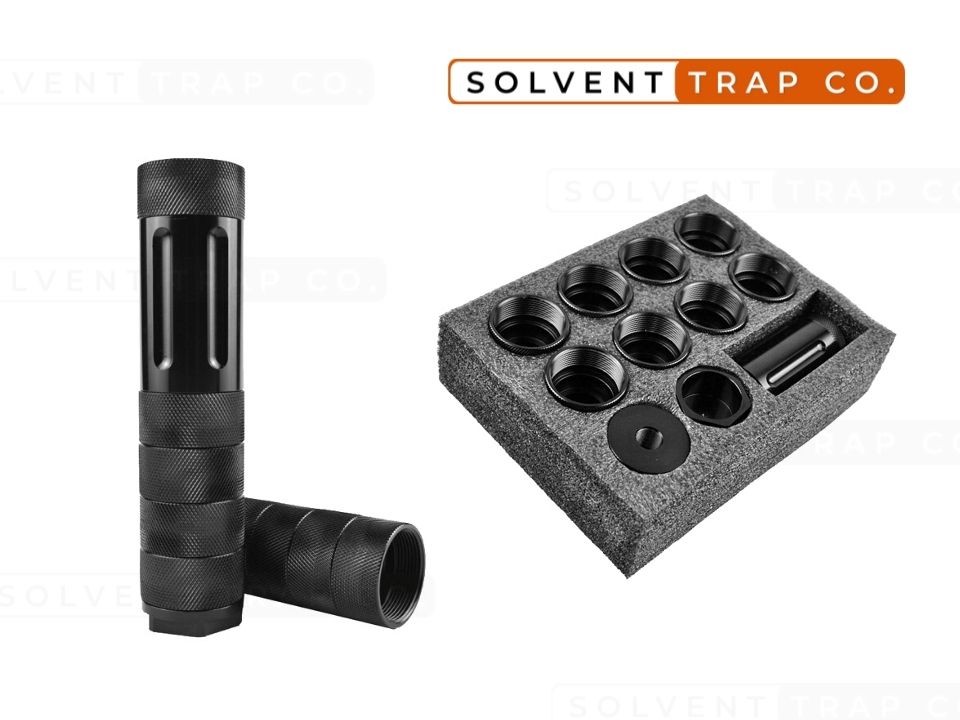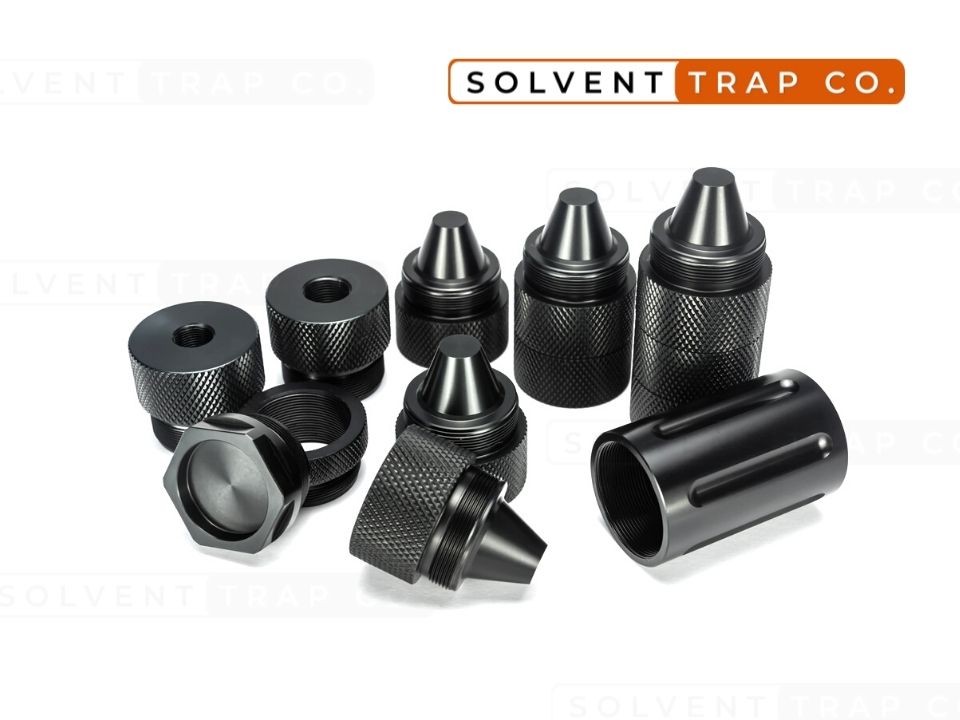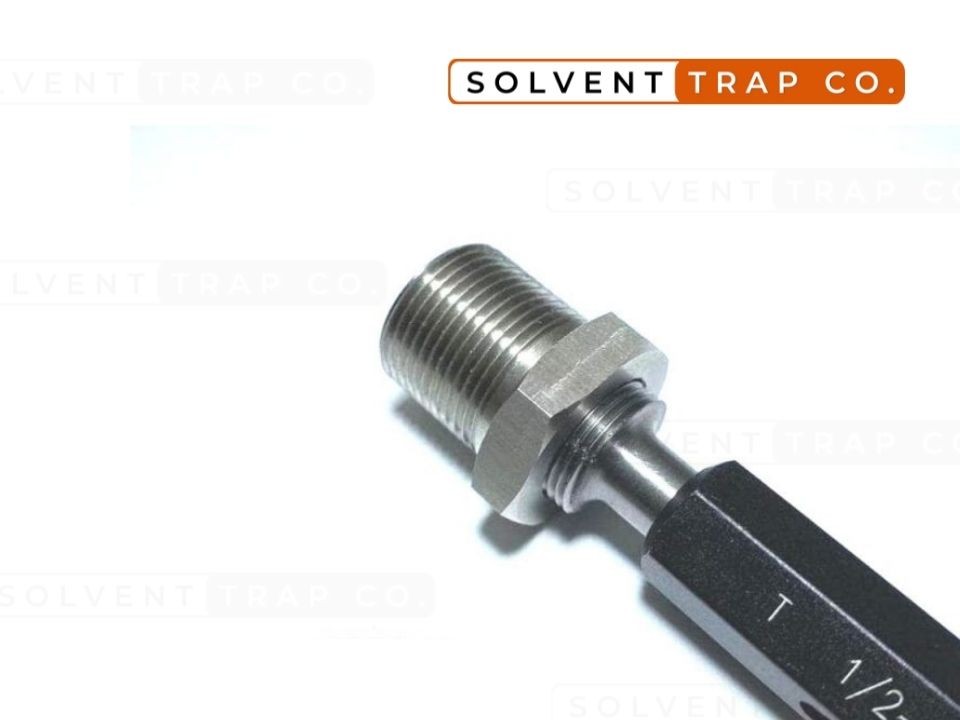ARE MONOCORE SOLVENT TRAPS LEGAL IN 2022?
[vc_row][vc_column][vc_custom_heading text=”What are Monocore Solvent Traps?” use_theme_fonts=”yes”][vc_column_text]Regular solvent traps do not have holes for a projectile or bullet to pass through. This is where monocore solvent traps differ. Monocore solvent traps are spiral-looking traps with holes in the center and throughout the cylinder. This makes them illegal, according to the ATF, since bullets can pass through the center – even though end caps are normally sealed with no hole or opening. Because of the way these solvent traps are constructed, they sometimes attract the attention of individuals who desire to use them as unregistered silencers or illegal suppressors.[/vc_column_text][/vc_column][/vc_row][vc_row][vc_column][vc_custom_heading text=”ATF Solvent Trap Regulations” use_theme_fonts=”yes”][vc_column_text]Although the ATF does not exactly have a list of what could be considered an illegal solvent trap, it does have a more or less unwritten rule or process that uses “constructive intent” to prove whether certain characteristics would deem a solvent trap an unregistered suppressor. This means that the solvent trap can be “potentially” used for alternate purposes aside from cleaning firearms if the unit has certain characteristics that imply they should be modified. One of the main characteristics that the ATF looks for is whether the end caps and internal cups of a solvent trap have dimples on them – The logic when it comes to dimples or “center marks” is that they demarcate where the purchaser should drill in order to convert the unit and allow a bullet to freely pass through the unit. The centered construction marks are used by the Feds to show “constructive intent,” and though the court system demands more than this, the ATF clings to “constructive intent” like a child does to its parents’ leg in a loud and busy mall. The funny part is, the ATF created the Form 1 process that allows anyone that can obtain an NFA Tax Stamp to build their own suppressors. They proceeded to make the process more efficient by adding the Form 1 application to their e-file application area. Therefore, it’s a little contradictory, to say the least, but this has become a habit with the ATF…but that’s neither here nor there.
Essentially, “constructive intent” means that the components of firearm accessories as well as their overall design are examined individually to determine whether they can be used as unregistered suppressors. Classifying them as unregistered suppressors makes them illegal. Based on this notion, monocore solvent traps are deemed illegal and are the most obvious and extreme examples.[/vc_column_text][/vc_column][/vc_row][vc_row][vc_column][vc_custom_heading text=”Monocore Buyers Beware” use_theme_fonts=”yes”][vc_column_text]Before purchasing any solvent traps, it is important that what you are aiming to buy is legal. This includes identifying what will be legal or otherwise within your area. In the US, you should be well aware of ATF regulations.
Solvent traps are essentially intended for cleaning firearms and can be used to trap cleaning fluids. They can be for reuse at a later date, depending on the user’s frequency of routine maintenance. Because they are attached to the end of the firearm’s barrel or with an adapter. They can be attached as a cleaning accessory and therefore are usually no more than “firearm accessories”.
Solvent traps are completely legal without a Form 1. This is however subject to the regulations provided by the ATF on the purchase and use of firearm accessories. Without obtaining permission in the form of an approved Form 1, you are not allowed to modify a solvent trap such that it can be used for muffling firearm sounds or to function as a silencer. This is one example of regulations by the ATF that could make the use of or purchase of solvent traps illegal.[/vc_column_text][/vc_column][/vc_row][vc_row][vc_column][vc_custom_heading text=”Regular Solvent Traps” use_theme_fonts=”yes”][vc_column_text]Again, solvent traps are perfectly legal. I mean, it is obvious the name of the unit is a “solvent trap”. If someone goes to home depot and buys a nail gun, it’s obviously a tool used to nail things together at your home or when constructing anything made out of wood or the like. If someone were to modify a nail gun to increase its FPS and range capability, it may then be deemed a firearm or more dangerous weapon. But, I don’t think Home Depot is licensed to sell firearms. What’s our point? Many things can be made into something else that the manufacturer never intended them on being converted into. Therefore, it is also about the “express intent” of the producer of solvent traps or tubular units in general. Are they selling these items as Form 1 kits or marketing them as DIY Suppressors? Again, in light of the ATF/NFA having a Form 1 process in place the Form 1 Kit topic is outside the scope of this article, but the fact that the ATF/NFA are proactively going after suppliers of Form 1 Kits when they created the very process for a Form 1 Kit is ludicrous, but we digress. There are suppressors, Form 1 Kits and standard solvent traps. Solvent traps are actually used for cleaning, go figure! Unfortunately, there are many illegitimate companies combined with an overreaching government that are making it difficult for legit producers of solvent trap cleaning kits from operating. Regular solvent trap kits are considered nothing more than firearm accessories and are used to clean firearms, making the cleaning process a lot more efficient and easy. The use of a solvent trap makes for a stress-free cleaning process that improves firearm safety, reliability, and overall performance.
Approved solvent traps (by the ATF) are not constructed in any way as to allow a bullet to pass through them, rendering them ineffective for any purpose other than cleaning firearms.[/vc_column_text][/vc_column][/vc_row][vc_row][vc_column][vc_custom_heading text=”Production of Monocore Solvent Traps” use_theme_fonts=”yes”][vc_column_text]You should note that many, if not most, monocore solvent traps are produced in foreign countries such as China, where regulations of the ATF do not apply. Foreign companies are not bound by laws outside their jurisdiction. However, as an American, purchasing such solvent traps could make it a felony.
Monocore solvent traps produced in China have been known to be too thin to handle the pressure of compressed cleaning solvent. In addition, due to their size, the interior bore of monocore solvent traps have known to cause serious damage to the firearm.[/vc_column_text][/vc_column][/vc_row][vc_row css=”.vc_custom_1645655519127{margin-top: 20px !important;}”][vc_column][vc_custom_heading text=”Why Monocore Solvent Traps are Illegal in 2022″ font_container=”tag:h1|text_align:left” use_theme_fonts=”yes”][vc_column_text]If it is not clear by now, monocore solvent traps are illegal and can result in a criminal offense when purchased because they have a hole in the center, and throughout the cylinder. Again, monocore products can be identified by the ‘spiral look’, which you should avoid if looking for a reliable cleaning accessory for your firearm cleaning process. Asides from the fact that the quality of these solvent traps is sub-standard, the design of these traps allows them to serve as underground suppressors. This combination makes monocore solvent traps illegal by US regulations (via the ATF).[/vc_column_text][/vc_column][/vc_row][vc_row][vc_column][vc_custom_heading text=”Caution Against Ordering Monocore Solvent Traps” use_theme_fonts=”yes”][vc_column_text]Illegal products may be confiscated by customs during import from a foreign country. Regardless of the cheap cost of these spiral-looking solvent traps, you want to purchase solvent traps that will be as long-lasting and won’t damage your firearm.[/vc_column_text][/vc_column][/vc_row][vc_row][vc_column][vc_custom_heading text=”Don’t Be Deceived” use_theme_fonts=”yes”][vc_column_text]The purchase and use of solvent traps are, on their own, perfectly legal. However, don’t be deceived by information on websites portraying illegal solvent traps such as ‘fuel filters’ or monocore solvent traps. After all, foreign production companies that make solvent traps are not bound by US laws.
When deciding to purchase a solvent trap, your priority should be the quality, durability, and overall effectiveness of the solvent trap. Asides from protecting you from potentially illegal solvent traps, this will help you save cost in the long run.
Be aware of regulations of firearms and related accessories within your regional or country’s jurisdiction to guide you on the purchase of legal solvent traps and firearms accessories.[/vc_column_text][/vc_column][/vc_row][vc_row][vc_column][vc_column_text]Solventtrap.co is focused on developing safe and environmentally friendly cleaning solutions. We specialize in Solvent Traps & other cleaning technologies for firearm maintenance.[/vc_column_text][/vc_column][/vc_row]





Leave a Reply